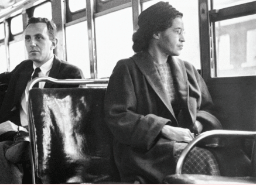ROSA PARKS - THE HEROINE
Rosa was born in the town of Tuskegee in Alabama, a state in southern USA. Her mother was a teacher and her father a carpenter, and she had a little brother called Sylvester. After her parents separated when she was just a little girl, Rosa and Sylvester moved with their mother to Alabama’s capital city, Montgomery. Rosa loved to learn and studied hard at high school. But, sadly, she had to leave school at 16 to care for her grandmother and, shortly after, her very sick mother. When she was 19 years old, Rosa married a barber called Raymond Parks, who encouraged her to return to high school to earn her diploma. And that’s just what she did, before beginning work as a seamstress in Montgomery. Life for African Americans like Rosa was hard. There was no ‘equality’. Created by white authorities who thought black people’s lives didn’t matter as much as theirs, these laws caused racial segregation and allowed for discrimination against African Americans – referred to at that time as “coloured” people. Black children in the late 19th century and early 20th century had separate schools to white children. Black people had separate schools, churches, libraries, restaurants, toilets, drinking fountains and waiting rooms. In some areas, there were laws banning black people from sports events and even forbidding them to work in the same office as a white person. African Americans had far fewer rights, too. Racist laws restricted them to low-paying jobs and made it incredibly difficult for them to vote. These laws also meant black people could be arrested for small things. In the face of such racism, Rosa decided to make a stand for what was right. Together with her husband Raymond, she joined the National Association for the Advancement of Coloured People (NAACP), working towards putting an end to discrimination and segregation. But it was on the 1st December 1955 that Rosa truly sparked change. After a long day at work, Rosa boarded the bus home and took a seat. At that time in Montgomery, seats at the front of buses were reserved for white passengers, and the seats at the back for black passengers. The bus quickly filled up and when a white man boarded, the driver told the African American passengers to give up their seats for him. While the other black passengers obeyed, Rosa did not. The result? Rosa was arrested by the police and fined for breaking segregation laws! But Rosa refused to pay and argued that it was the law that was wrong, not her behaviour. Rosa died of natural causes on 24th October 2005 at the age of 92. But she continues to be recognised all over the world as a symbol of freedom and equality.

